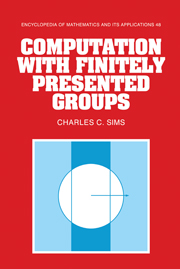Book contents
- Frontmatter
- Contents
- Preface
- Introduction
- 1 Basic concepts
- 2 Rewriting systems
- 3 Automata and rational languages
- 4 Subgroups of free products of cyclic groups
- 5 Coset enumeration
- 6 The Reidemeister-Schreier procedure
- 7 Generalized automata
- 8 Abelian groups
- 9 Polycyclic groups
- 10 Module bases
- 11 Quotient groups
- Appendix Implementation issues
- Bibliography
- Index
10 - Module bases
Published online by Cambridge University Press: 06 March 2010
- Frontmatter
- Contents
- Preface
- Introduction
- 1 Basic concepts
- 2 Rewriting systems
- 3 Automata and rational languages
- 4 Subgroups of free products of cyclic groups
- 5 Coset enumeration
- 6 The Reidemeister-Schreier procedure
- 7 Generalized automata
- 8 Abelian groups
- 9 Polycyclic groups
- 10 Module bases
- 11 Quotient groups
- Appendix Implementation issues
- Bibliography
- Index
Summary
In Chapter 11 we shall discuss algorithms for determining various solvable quotient groups of a group given by a finite presentation. One of these algorithms is the Baumslag-Cannonito-Miller polycyclic quotient algorithm. This algorithm involves computation in finitely generated modules over group rings of polycyclic groups. These rings are in general noncommutative but they are similar in many ways to rings of polynomials. An important special case is the group ring of a free abelian group, which is more commonly referred to as a ring of Laurent polynomials.
The group ℤn is a free ℤ-module of rank n. A subgroup, or ℤ-submodule, H of ℤn can be described conveniently by a matrix in row Hermite normal form. This description makes it relatively easy to check membership in H and hence to solve the word problem in ℤn/H. Now let R be the ring ℤ[X1, …, Xm] of polynomials with integer coefficients in the indeterminates X1, …, Xm. Then Rn is a free R-module of rank n. Let M be the R-submodule generated by a finite subset T of Rn. Given T, we shall need to produce another module generating set for M which will allow us easily to decide membership in M and so permit us to solve the word problem in Rn/M.
The algorithms for manipulating integer matrices developed in Chapter 8 can be generalized. Unfortunately, when m becomes even moderately large, the space requirements of this approach become very great. There is an alternative. The technique of Grobner bases was originated by Bruno Buchberger in the 1960s. It has become a very important tool in computational commutative algebra.
Information
- Type
- Chapter
- Information
- Computation with Finitely Presented Groups , pp. 448 - 513Publisher: Cambridge University PressPrint publication year: 1994
